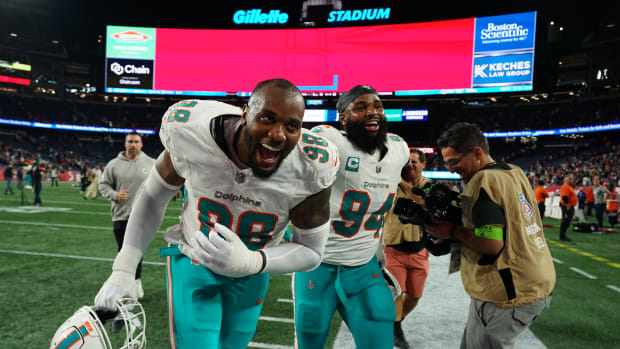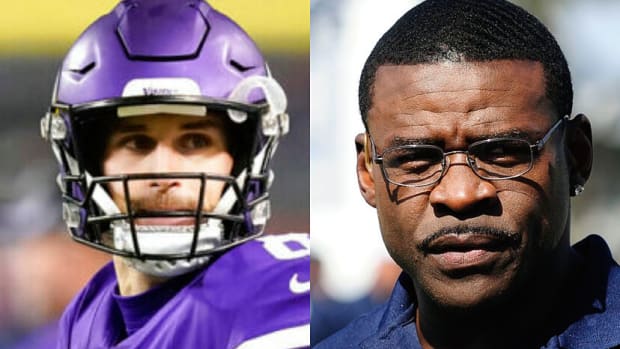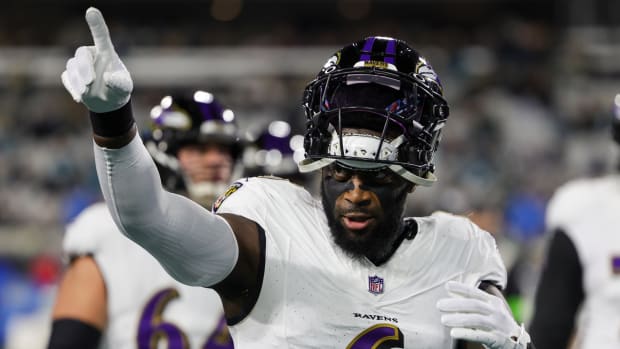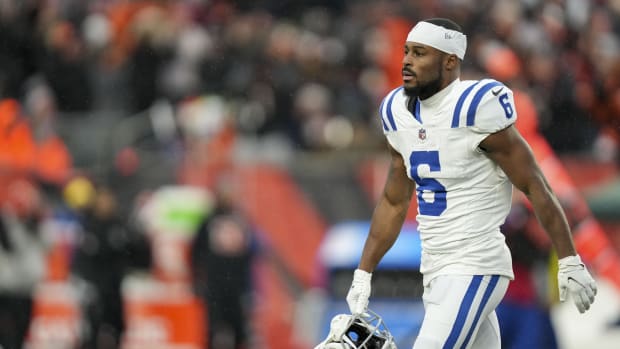Best in the AFC West: 10 Thoughts on the 2018 Chargers
With the NFL season just a few weeks away, Andy Benoit is previewing every NFL team in reverse order of last season’s finish. Up today: the Los Angeles Chargers, who finished 9–7 in 2017. This is an updated version of a story that originally ran in June for The MMQB's California Week.
1. After averaging 310 yards through the air in November and December, the Chargers finished 2017 with the NFL’s No. 1 passing offense. There were three reasons: A) Philip Rivers was great. B) Keenan Allen became a full-fledged No. 1 receiver. His route running mechanics are unmatched, particularly on in-breakers. C) Offensive coordinator Ken Whisenhunt has a sharp scheme. The Chargers use a lot of pre-snap motion to undress the defense. They are deceptive out of base two-back or two-tight end personnel. They out-leverage pass defenders with stack and switch releases that intertwine receivers’ routes. They run different types of route combinations on different sides of the field. With Allen more than a year removed from his knee injury, 2017 seventh overall pick Mike Williams healthy, and downfield weapons Tyrell Williams and Travis Benjamin back, this can again be one of the league’s most productive aerial attacks.
The only caveat is the loss of tight end Hunter Henry (ACL), which hurts, even if Antonio Gates is brought back. (Gates is crafty, but his depleted speed can change the way opponents defend this passing game.) Henry was becoming a more diverse receiver, capable of aligning anywhere in the formation. One thing this offense did well in ’17 was distort defenses by spreading the formation on one side and condensing it on the other side. That’s hard to do without a tight end.
2. Rivers has all the traits of an elite QB: accuracy, field vision, throwing anticipation (which can sometimes be a substitute for arm strength, not that Rivers’s is declining), pocket mobility and total control at the line of scrimmage. Rivers is just a tick less consistent than Brady/Brees/Rodgers, but on any given day—and most days, for that matter—he plays like those guys. Don’t be fooled by his 4-5 playoff record; Rivers can absolutely lead a team to the Super Bowl.
3. This team’s Super Bowl fate hinges on whether it finds an identity on the ground. Melvin Gordon often has a tad more juice than you’d guess, but he’s not innately nimble. He needs a scheme that consistently defines his point of attack. Head coach Anthony Lynn over the years has employed a lot of “gap scheme” runs, which feature pull-blockers and man-to-man blockers. Gordon at times has shined here.
4. No. 2 running back Austin Ekeler has sneaky value. He’s an excellent all-around receiver, including when he splits out wide in empty formations—something the Chargers love to do. Ekeler might play only 30 percent of the snaps, give or take, but his mismatch-making versatility will be a defining part of Los Angeles’s offense.
5. This will be a top-five offense if the O-line gets as strong in run-blocking as it is in pass protection. Russell Okung has stabilized the left tackle situation, and Mike Pouncey’s arrival injects athleticism at center. A lot comes down to the second-year guards. Second-rounder Forrest Lamp is coming off a torn ACL that wiped out his rookie season. He’ll compete with the up-and-down Michael Schofield for playing time. On the other side, the jury is still out on third-rounder Dan Feeney.
6. In the NFL, you need one of two elements for a quality defense: edge rushers or cover corners. The Chargers have both. On the edge, Joey Bosa and Melvin Ingram form as dynamic a pairing as you’ll find. Their lateral explosiveness is lethal on schemed pass-rush concepts like stunts and twists. At corner, Casey Hayward is a true No. 1, while a third-straight season-ending injury to Jason Verrett (this time an Achilles) leaves ascending third-year pro Trevor Williams as the No. 2, with Desmond King in the slot.
7. Defensive coordinator Gus Bradley is regarded as a pure Seahawks-style Cover 3 aficionado. In fact, he’s credited with originating parts of the scheme. Bradley likes its simple, straightforward approach, believing it lets defenders play faster and improve over the course of a season. But last year the Chargers were much more than just a Cover 3D. They played significant snaps of man-to-man, particularly on third downs, where Bradley liked to rotate a free defender (aka a “robber”) into the middle of the defense. They also employed Cover 2 zone in certain throwing situations, and on many of these they diversified their pass-rushing stunts, moving Bosa and especially Ingram all over.
10 Thoughts on the 2018 Broncos, Who Have a New QB and One of the Best Defenses Around
8. Bosa’s and Ingram’s pass-rushing impact tailed off last year because they had to play more conservatively to help an L.A. run defense that ranked 32nd in yards per attempt. GM Tom Telesco addressed the run-D deficiency in the draft with first-round safety Derwin James, second-round linebacker Uchenna Nwosu (whom Bradley believes can fulfill this scheme’s high demands for speed) and third-round defensive tackle Justin Jones. That’s potentially three new defensive starters up the middle.
9. Where will the first-rounder Derwin James play? He’s best suited for the box, but so are incumbent safeties Rayshawn Jenkins and the grossly underrated Jahleel Addae. Raw talent makes James the best option for free safety, but that could be putting your first-round pick in a suboptimal spot. Might the Chargers instead try their luck with Addae? For ranginess, what he lacks in speed he could (potentially) make up for with awareness.
10. An unsung hero is defensive tackle Darius Philon. Yes, he’s a backup interior player for what was 2017’s worst run defense, so this isn’t saying he’s a star in waiting. But Philon stood out on film a few times each game. The Chargers have an excellent rotation at 3-technique with him backing up Corey Liuget, who is suspended for the first four games.
BOTTOM LINE: With a loaded offense and potentially playmaking defense, this is the best team in the AFC West.
• Question or comment? Email us at talkback@themmqb.com.





































